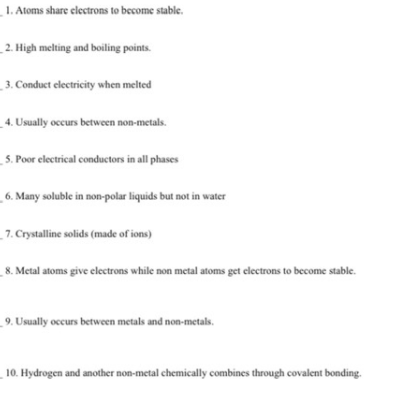Instructions: Classify the following properties as either lonic or Covalent compounds. Write ionic or covalent on the space before cach property. 1. Atoms share electrons to become stable. 2. High melting and boiling points. 3. Conduct electricity when melted 4. Usually occurs between non-metals. S. Poor electrical conductors in all phases 6. Many soluble in non-polar liquids but not in water 7. Crystalline solids (made of ions) 8. Metal atoms give electrons while non metal atoms get electrons to become stable. 9. Usually occurs between metals and non-metals. 10. Hydrogen and another non-metal chemically combines through covalent bonding.
Instructions: Classify the following properties as either lonic or Covalent compounds. Write ionic or covalent on the space before cach property. 1. Atoms share electrons to become stable. 2. High melting and boiling points. 3. Conduct electricity when melted 4. Usually occurs between non-metals. S. Poor electrical conductors in all phases 6. Many soluble in non-polar liquids but not in water 7. Crystalline solids (made of ions) 8. Metal atoms give electrons while non metal atoms get electrons to become stable. 9. Usually occurs between metals and non-metals. 10. Hydrogen and another non-metal chemically combines through covalent bonding.
Chemistry
10th Edition
ISBN:9781305957404
Author:Steven S. Zumdahl, Susan A. Zumdahl, Donald J. DeCoste
Publisher:Steven S. Zumdahl, Susan A. Zumdahl, Donald J. DeCoste
Chapter1: Chemical Foundations
Section: Chapter Questions
Problem 1RQ: Define and explain the differences between the following terms. a. law and theory b. theory and...
Related questions
Question
Answwe all questions urgently please !!!!!
filling in the blank spaces

Transcribed Image Text:Instructions: Classify the following properties as either lonic or Covalent compounds. Write
ionic or covalent on the space before cach property.
1. Atoms share electrons to become stable.
_2. High melting and boiling points.
3. Conduct electricity when melted
4. Usually occurs between non-metals.
5. Poor electrical conductors in all phases
6. Many soluble in non-polar liquids but not in water
7. Crystalline solids (made of ions)
8. Metal atoms give electrons while non metal atoms get electrons to become stable.
9. Usually occurs between metals and non-metals.
10. Hydrogen and another non-metal chemically combines through covalent bonding.
Expert Solution
Step 1
The questions given are

Trending now
This is a popular solution!
Step by step
Solved in 4 steps with 1 images

Knowledge Booster
Learn more about
Need a deep-dive on the concept behind this application? Look no further. Learn more about this topic, chemistry and related others by exploring similar questions and additional content below.Similar questions
Recommended textbooks for you

Chemistry
Chemistry
ISBN:
9781305957404
Author:
Steven S. Zumdahl, Susan A. Zumdahl, Donald J. DeCoste
Publisher:
Cengage Learning

Chemistry
Chemistry
ISBN:
9781259911156
Author:
Raymond Chang Dr., Jason Overby Professor
Publisher:
McGraw-Hill Education

Principles of Instrumental Analysis
Chemistry
ISBN:
9781305577213
Author:
Douglas A. Skoog, F. James Holler, Stanley R. Crouch
Publisher:
Cengage Learning

Chemistry
Chemistry
ISBN:
9781305957404
Author:
Steven S. Zumdahl, Susan A. Zumdahl, Donald J. DeCoste
Publisher:
Cengage Learning

Chemistry
Chemistry
ISBN:
9781259911156
Author:
Raymond Chang Dr., Jason Overby Professor
Publisher:
McGraw-Hill Education

Principles of Instrumental Analysis
Chemistry
ISBN:
9781305577213
Author:
Douglas A. Skoog, F. James Holler, Stanley R. Crouch
Publisher:
Cengage Learning

Organic Chemistry
Chemistry
ISBN:
9780078021558
Author:
Janice Gorzynski Smith Dr.
Publisher:
McGraw-Hill Education

Chemistry: Principles and Reactions
Chemistry
ISBN:
9781305079373
Author:
William L. Masterton, Cecile N. Hurley
Publisher:
Cengage Learning

Elementary Principles of Chemical Processes, Bind…
Chemistry
ISBN:
9781118431221
Author:
Richard M. Felder, Ronald W. Rousseau, Lisa G. Bullard
Publisher:
WILEY